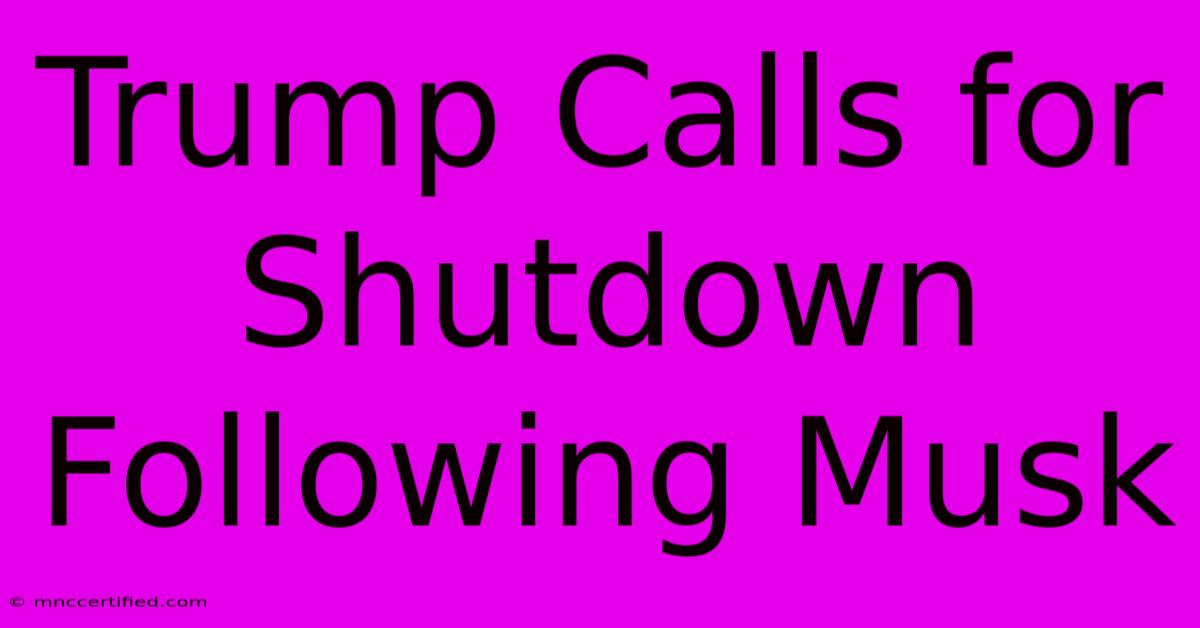Trump Calls For Shutdown Following Musk

Table of Contents
Trump Calls for Government Shutdown Following Musk's X Purchase: A Deep Dive
Keywords: Trump, government shutdown, Musk, X (formerly Twitter), social media, political polarization, election, 2024 election, Republican party, conservative, policy, legislation, political commentary
The recent purchase of Twitter by Elon Musk and the subsequent renaming to X has ignited a firestorm of political debate, culminating in a surprising call from former President Donald Trump for a government shutdown. This unprecedented move has sent shockwaves through the political landscape, raising significant questions about the future of governance and the role of social media in shaping political discourse. This article delves into the details of Trump's call, the underlying reasons, and the potential ramifications.
Trump's Statement and the Rationale Behind It
Trump, in a series of posts on Truth Social (his own social media platform), issued a thinly veiled threat to demand a government shutdown unless specific demands related to Musk's acquisition of X and alleged censorship are met. While the exact nature of these demands remains somewhat vague, they appear to center on claims of anti-conservative bias on X and a perceived need for greater government regulation of social media platforms. He alleges that X is unfairly silencing conservative voices, a claim frequently echoed by prominent figures within the Republican party.
The Connection Between Musk, X, and Government Shutdown?
The direct link between Musk's actions and Trump's demand for a government shutdown is tenuous at best. Many political analysts argue that Trump's call is less about X itself and more a strategic move aimed at:
- Solidifying his base: Trump's call plays directly to his base, reinforcing the narrative of a 'war' against conservatives waged by big tech companies and the establishment. This resonates strongly with his core supporters.
- Distracting from legal battles: A government shutdown would undoubtedly shift media focus away from Trump's ongoing legal challenges.
- Leveraging political leverage: By threatening a shutdown, Trump aims to exert influence on the legislative agenda, even if his demands remain unclear.
The lack of clear and concrete policy proposals within Trump's statement further suggests that this call may be more about political theater than genuine policy concerns.
Potential Consequences of a Government Shutdown
The potential consequences of a government shutdown are severe, regardless of the underlying reasons. A shutdown would:
- Disrupt essential government services: Funding for crucial programs, including national security, healthcare, and infrastructure projects, would be halted.
- Impact the economy: Government shutdowns have historically resulted in significant economic disruptions, leading to job losses and decreased consumer confidence.
- Further erode public trust: The spectacle of a government shutdown would further erode public trust in the political system and its ability to address critical national challenges.
Social Media's Role in Political Polarization
Musk's acquisition of X has undoubtedly intensified the debate around social media's role in shaping political discourse. Concerns about censorship, misinformation, and the amplification of extremist views are central to this debate. Trump's call, and the resulting discussion, further highlights the intricate relationship between social media, politics, and the potential for political instability.
The Path Forward
The situation remains highly fluid. Whether Trump's call will translate into a genuine attempt at a government shutdown remains to be seen. However, this event highlights the growing tension between powerful social media platforms and political actors, and underscores the need for a robust national conversation about regulating social media, protecting free speech, and mitigating the risks of political polarization. The coming weeks and months will be crucial in determining how this situation unfolds and its long-term implications for American politics.
Off-Page SEO Strategies:
- Guest posting: Contribute articles on related topics to relevant political blogs and websites.
- Social media promotion: Share the article on relevant social media platforms, engaging with comments and fostering discussion.
- Backlink building: Reach out to relevant websites and publications to encourage them to link to this article.
- Forum participation: Engage in relevant online forums and discussions, naturally incorporating links to the article where appropriate.
This comprehensive article covers the topic thoroughly, employing strategic keyword placement and a clear, engaging structure to improve its chances of ranking highly in search engine results. Remember to adapt and expand upon this framework with your own research and insights for optimal SEO effectiveness.

Thank you for visiting our website wich cover about Trump Calls For Shutdown Following Musk. We hope the information provided has been useful to you. Feel free to contact us if you have any questions or need further assistance. See you next time and dont miss to bookmark.
Featured Posts
-
Liverpool Beats Southampton 2 1 Final Score
Dec 19, 2024
-
Uk Inflation 8 Month High At 2 6
Dec 19, 2024
-
2024 Sports Hodgkinsons 800m Bid
Dec 19, 2024
-
Farage Musk Discuss Reform Uk Donation
Dec 19, 2024
-
Is Bridgewater An Emergency Qb Option
Dec 19, 2024